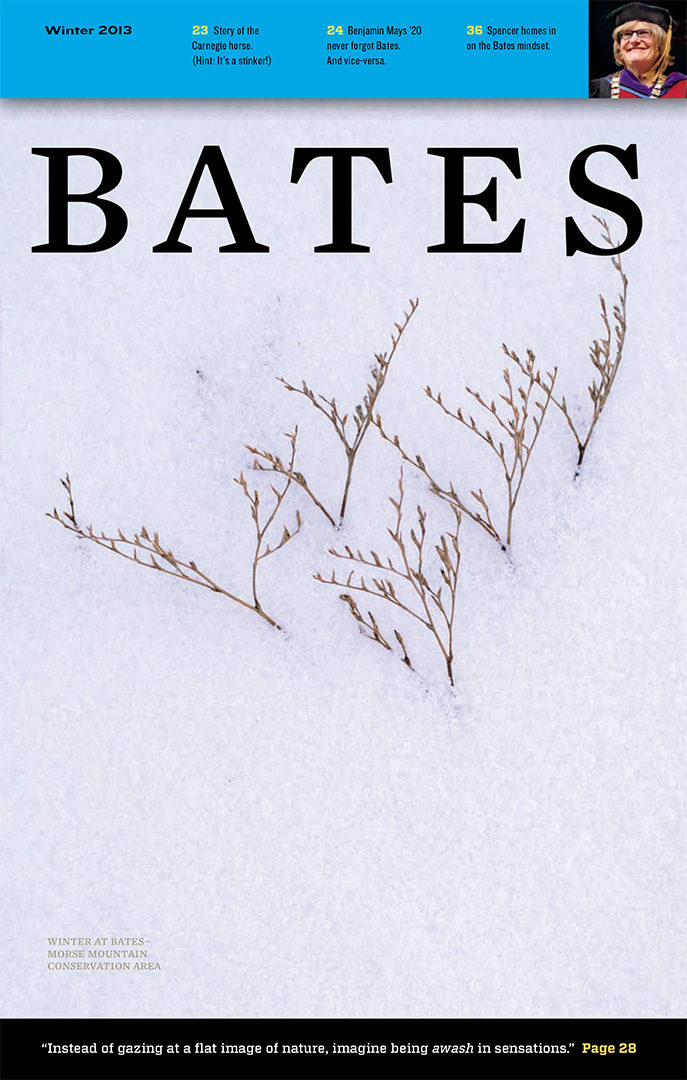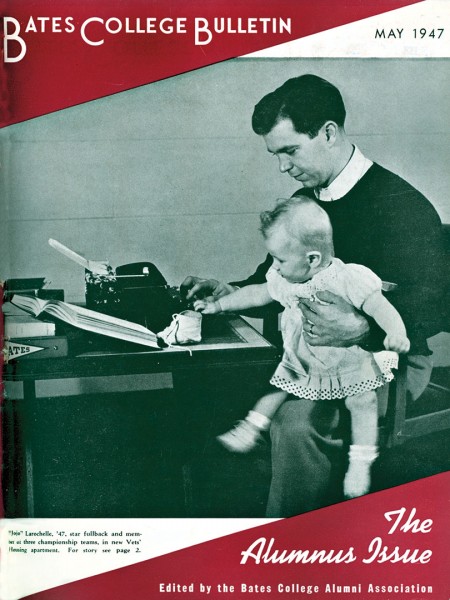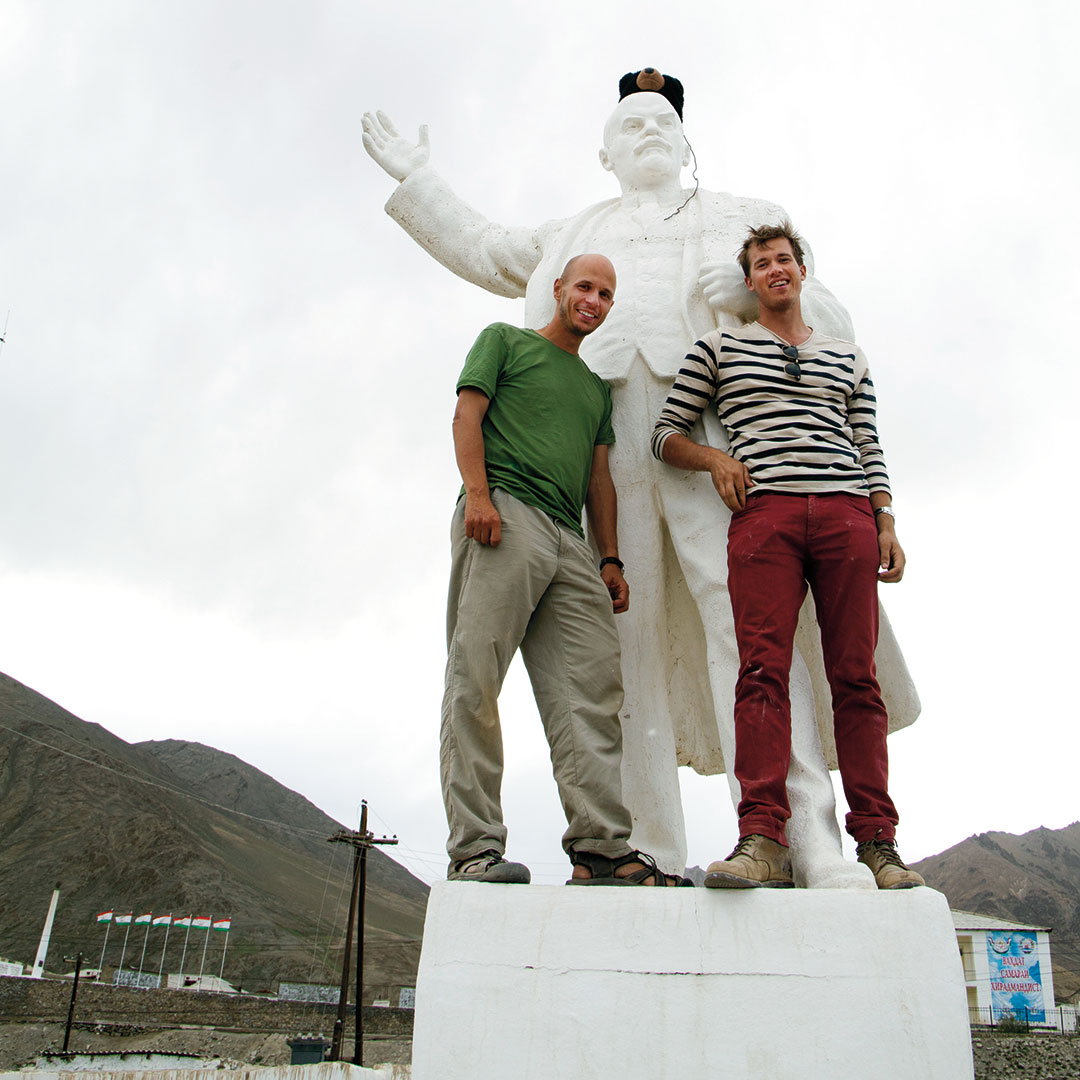
Letters: Winter 2013
By about a 10–1 margin, readers approved of the Bates Magazine makeover that debuted with the Spring 2012 issue. Some said the perfect binding — rather than saddle stitched — makes the magazine hard to keep open. Hint: The binding is more malleable than you might think! Sample comments:
Outstanding job! As an enthusiastic alum (and a long, long-retired IBM manager of graphic design), I “happily pronounce” the new number intelligent, inviting and a joy to both read and behold. An encore may well present a challenge, but the timing for Clayton Spencer’s arrival is exquisite. Heartiest congratulations.
Jonas Klein ’54
Falmouth, Maine
We’re on the beach in Florida reading Bates Magazine. It is fantastic.
Bates Parent
By phone
I have mixed feelings about the new format for Bates Magazine. It doesn’t read easily from left to right, given all the marginal notes, boxes and extended captions. It reminds me of The One-Page Magazine feature in The New York Times magazine. The Bates format is better, but not much. Overall, I think it’s trying too hard to be cute or different, but it’s always good to see if there’s a better way than “the way we’ve always done it.”
Lyn Whiston ’66
Glen Ellyn, Ill.
More redesign comments at bates.edu/magazine/redesign/reactions. — Editor
Lofty Perspective
The aerial campus photo (“From a Distance,” Spring 2012) vividly reminded me of what Bates has meant to me.
In 1994, I arrived with great intentions of becoming a physician. Two pivotal events that fall allowed that path to change — for the better.
First, President Donald Harward welcomed us by urging us to “pursue paths of ambiguity.” What I took from this speech was that Bates was ready for us to experience life in new ways we hadn’t even yet imagined.
Second was meeting Stuart Abelson ’97, president of the Bates Aviators. Full of contagious energy and excitement, Stuart urged me and other flying enthusiasts not only to join the club, but also to try an introductory flight at the Auburn-Lewiston Municipal Airport.
I did, becoming enamored with flying that fall even as I discovered my shortcomings in chemistry. I considered leaving Bates to attend an aviation-specific college but stayed to pursue my own paths of ambiguity.
I majored in Spanish, spent a year abroad in Costa Rica (where I met my wife) and wrote a thesis in Spanish literature with the gracious guidance of Professor Baltasar Fra-Molinero.
After earning my private pilot’s license (and floatplane license at Twitchell’s Airport in Turner), I frequently took Batesies on aerial tours of campus and Maine, working at Security and Campus Safety and Twin Cities Air Service to support this new passion.
My post-Bates life found me pursuing my passion. After several years as a flight instructor and charter pilot in New England, life brought my wife and me to the paradisiac island of Vieques, Puerto Rico, where I flew a nine-passenger propeller plane on short flights between Puerto Rico and the Virgin Islands.
Now a Canadair Regional Jet captain for a Delta Connection carrier, Pinnacle Airlines, I still look back very fondly on those formative days as a pilot, Bates student and citizen of the world.
Thanks for putting together a great magazine. Thanks to Bates for encouraging students to be themselves and open their eyes to the world.
David Tzeutschler ’98
St. Paul, Minn.

In his letter, Rocky Query explains the misgivings about the GI Bill in 1944 that President Spencer alluded to in her inaugural address. While the union of excellence and opportunity embodied in GI Bill was old hat for Bates, the return of older servicemen and their families to Bates did shake up the campus scene, as suggested by the cover photo of the May 1947 Bulletin, showing Joseph LaRochelle ’44 and his 1-year-old daughter, Mary Jo — now Mary Jo LaRochelle McBride-Beece ’68.
“Hobo Jungles” Explained
I read President Clayton Spencer’s inaugural address, “Questions Worth Asking,” with great interest and appreciation.
In her address, President Spencer comments on the importance of the GI Bill in expanding educational opportunities for a diverse pool of human talent. She contrasts that legacy with fears expressed by Robert Hutchins, president of the University of Chicago at the time of the GI Bill’s passage, who said that “colleges and universities will find themselves converted into educational hobo jungles” as a result of the act.
Some might take from this quotation that Hutchins did not share President Spencer’s belief in the importance of openness and opportunity in higher education.
On the contrary. In his 1944 essay in Collier’s, from which the “hobo jungle” language is taken, Hutchins notes that U.S. higher education has been the “preserve of the relatively rich,” and notes hopefully that the GI Bill seeks to incorporate “into our national policy the principle that there must be no relation between the education of a citizen and the income of parents.”
What, then, were the concerns Hutchins had with the GI Bill?
He explained that because “educational institutions, as the big-time football racket shows, cannot resist money,” they would be distracted from a commitment to their mission by the revenues to be gained from the GI Bill.
Colleges, he said, “will not want to keep out unqualified veterans; they will not want to expel those who fail.”
Further, Hutchins worried that the principle of educational opportunity embodied in the GI Bill would be discredited when educators faced students more concerned with vocational assistance than a liberal arts education. And he worried that such students might feel defrauded by receiving an education ill-suited to helping them find employment.
Today, some universities have indeed taken on aspects of Hutchins’ feared hobo jungle, as students seek educational credentials not out of intellectual curiosity or commitment to academia but because they need jobs. Today’s applicants to Bates seek the benefits of the college’s commitment to an excellent liberal arts education, but they are also concerned with the price and affordability of the education they are paying for.
Hutchins’ concerns still seem valid, even as institutions like Bates have avoided the demoralization he feared. I suspect he would, in fact, be heartened by the optimism reflected in President Spencer’s approach to today’s important educational questions and by the enthusiastic response she has elicited so far from the Bates community.
James “Rocky” Query
Philadelphia
President Spencer’s inaugural address is at bates.edu/inauguration. Read about Nate Boone ’52 and the GI Bill on page 52. — Editor
Blue Bobcats
Our statement that no Blue Devil from Lewiston High School “in recent memory” had played baseball for Bates before Mekae Hyde ’15 and Alex Parker ’15 joined the team last year prompted a couple letters.
“Recent memory” probably is right, but my not-so-recent memory contains the following:
Larry Quimby ’52 was the son of Professor Brooks Quimby and Inez Robinson Quimby, both Class of 1918. He graduated from Lewiston High, and I played with him — he was an excellent pitcher. His senior thesis was on the history of baseball.
Dave Harkins ’53 was an excellent catcher on our team, and a Lewiston High graduate.
Fred Lebel ’53 was a good player who was at Bates for a year or so, at a time when freshmen couldn’t play varsity sports.
Jim Moody ’53
Cape Elizabeth, Maine
The late Norm Parent ’50 was a legendary Lewiston High School football coach and Lewiston High grad who played on the 1946 Glass Bowl football team in addition to baseball.
Marc Levasseur ’84 was a LHS grad who played baseball when the baseball field was where the Village is now. And Matt Madden ’87 played baseball; his son Chris ’16 is now at Bates.
Jim Taylor
Lewiston, Maine
Taylor is head athletics equipment manager. — Editor
Please Write
We love letters. Letters may be edited for length (300 words or fewer preferred), style, grammar, clarity and relevance to college issues and issues discussed in Bates Magazine.
Email your letter to: magazine@bates.edu
Or post it to:
Bates Magazine
Bates Communications Office
141 Nichols St.
Lewiston ME 04240




